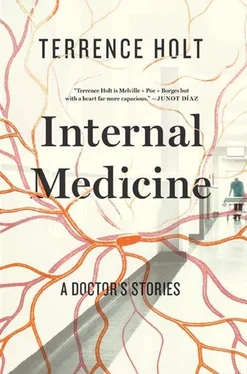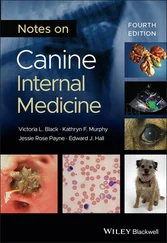The patient, an amiable, clueless fellow whose chief complaint when I met him after rounds was the absence of breakfast, looked better than his story sounded. Weight loss is a relative thing, after all, and until you get into the absolute end of the range, it usually doesn’t show. He was a skinny man, who coughed once or twice with the weary, pained expression of a person who has coughed too much recently, and obligingly deposited the product in the plastic jar he’d been given for the purpose. The contents of the jar looked nasty, but then they always do. “When am I gonna eat?” he said, when he had finished screwing the lid back on the jar.
We explained about the EGD, and how he needed an empty stomach for the test. “Okay,” he said. “And when’s that gonna be?”
We told him that it was hard to say. It’s always hard to say. This is more than usually distressing because most of the people waiting for the call are waiting with empty stomachs, and despite the low quality of the hospital food, breakfast is by far the best of it. Even dinner starts to smell pretty good when your roommate is being served and you’re still waiting for your call to GI. So we’re used to explaining to people why they can’t eat: it’s the kind of bad news that takes a while to sink in.
Mr. Jenkins spat disconsolately, as if he had a bad taste in his mouth, and we excused ourselves, promising to let him know as soon as we heard anything. Which of course we didn’t, because we got busy with new admissions and no one ever tells the house staff anything anyway.
So when the number for GI procedures showed up on my pager it took me a moment to remember Mr. Jenkins. But that was all right because when I dialed it and heard the phone say, “GI procedures,” they put me on hold before I could give my name.
Orville Shayne picked up. Orville, known universally as “Awful,” was a first-year GI fellow from Chicago who had earned his nickname by being the most abrasive personality in the entire hospital. He was not averse to lessoning his betters now and then, and was entirely too eager to lecture the rest of us whenever possible.
“Who is this?” he demanded.
“It’s Harper,” I said. “You paged me.”
“Harper. What are you going to do about your Mr. Jenkins?”
“What?” I replied, perhaps unwisely.
“Jenkins! Your Mr. Jenkins! The one you sent down here with”—he searched for a word sufficiently scathing—“ pneumonia .”
“Look, Orville,” I said, enunciating carefully, “is there a point to this? ’Cause I’ve got an admission down in the ER, and—”
“And you don’t care about your Mr. Jenkins, is that it?”
This was starting to get me mad. “Do you want to tell me something, Orville?”
He snorted. “I suppose I’ll have to, since I doubt you could interpret the pictures, which are in Mr. Jenkins’s chart, by the way. Tell me,” he said, “do you know what cancer is?”
What everyone wishes you’d get, I thought, but said nothing.
“As I suspected,” Orville sneered. “Well, it’s what your Mr. Jenkins has growing in his esophagus. Which is why he can’t swallow, which is why he’s losing weight, which is why he’s got your pneumonia .” And then the line went dead.
Mr. Jenkins had esophageal cancer. It made sense. As Orville had so helpfully spelled out, it was the unifying explanation.
But what a nasty explanation it was. As it happened, I did know something about cancer, enough to know that esophageal cancer is an especially bad thing. It’s not all that common; smoking and alcohol are probably risk factors. By the time it’s diagnosed it is usually, as the oncologists say, out of the barn. Your odds of being alive five years after diagnosis are less than one in twenty. Starvation, hurried along by metastatic disease in the lung, liver, and brain, is the usual mode of death. You can try to put a rigid liner in the esophagus to hold it open. You can try radiation. And, for the optimistic, you can try chemotherapy. It was a dismal future Mr. Jenkins had in store. And it was up to me, I realized as I turned from the phone, to tell him.
It wasn’t, really. It wasn’t, technically, up to me. The service I was on had a number of doctors with more knowledge and experience than I had. There was the resident, of course, still in-house. There was the attending, now gone home for the night, but he could certainly break the news in the morning — a lot better than I would, since he’d had the experience before.
I hadn’t had the experience. And I needed it. And, to be strictly truthful, I wanted it. This was how we were supposed to learn. He was my patient, and I felt responsible for him. But, also, I wanted to be the one to tell him. It’s something I can’t explain — didn’t understand then and perhaps would rather not understand about myself now. I hadn’t had the experience, and I wanted to get it. So I squared my shoulders and marched down the hallway to Mr. Jenkins’s room.
He was the only occupant of a double on the west side of the tower. Here on the sixth floor the view out the window was a sweep down the hill to the town, garish under sodium-vapor streetlights. The yellow glow from the street was the only light in the room. Mr. Jenkins was in bed, asleep. He was snoring unevenly, a little puddle gleaming darkly on the pillow beside his open mouth.
I stood at his bedside, listening to him breathe. Regular, unlabored, a little rattly, but basically the automatic tidal motion of a man in the middle of his life, the rhythm he had been maintaining from the moment of his birth. I stood there and listened to it, unconsciously holding my own breath for a long time until I realized what I was doing and drew a ragged breath out of the dark.
“Mr. Jenkins?” I said softly.
No answer.
“Mr. Jenkins?” I said again. This time I reached down and pressed his shoulder slightly. He stirred, and abruptly he was wide awake, astounded, raised on his elbow staring around the room.
“Wha’?” he said, or something to that effect. He was starting to pull back from me. In the darkened room, his eyes were enormous.
“Easy, Mr. Jenkins,” I said in what I doubted was a reassuring tone. “You’re in the hospital. Remember? I’m Dr. Harper. We met this morning.”
Mr. Jenkins continued to stare at me as if I were a ghost, but he gradually subsided, muttering something I didn’t catch beyond the tone of ebbing shock.
“Are you awake, Mr. Jenkins?”
He nodded, perhaps a more polite answer than the question deserved. And he lay there, still propped up on one elbow, waiting.
I realized that I had no idea how to proceed. I tried to think of something, but all I could come up with was the tune to “The Yellow Rose of Texas.” It kept repeating itself unhelpfully, scattering my thoughts: beyond that, all of the advice from that long-ago dreary afternoon with Emily Dickinson had evaporated. And Jenkins was waiting. As if aware of my uneasiness, he was starting a shy, reassuring smile.
“Mr. Jenkins,” I began.
He nodded at me encouragingly.
“I’m afraid I’ve got some bad news.”
For a horrible ten or twelve seconds, the smile lingered on his face while the rest of his features abandoned it until it hung there in empty air.
“That test we did this afternoon?”
He nodded.
“It found a — a mass.”
This wasn’t right, I realized. I should just name it.
“They found cancer, Mr. Jenkins. That’s why you’ve been having trouble swallowing. That’s why you’ve been losing weight.”
I stopped for a moment, unable to go on. In the silence that lay between us I recalled dimly that I was supposed to do this, supposed to give the patient time to grasp the news. Reassured by this, I let the silence grow.
Читать дальше












